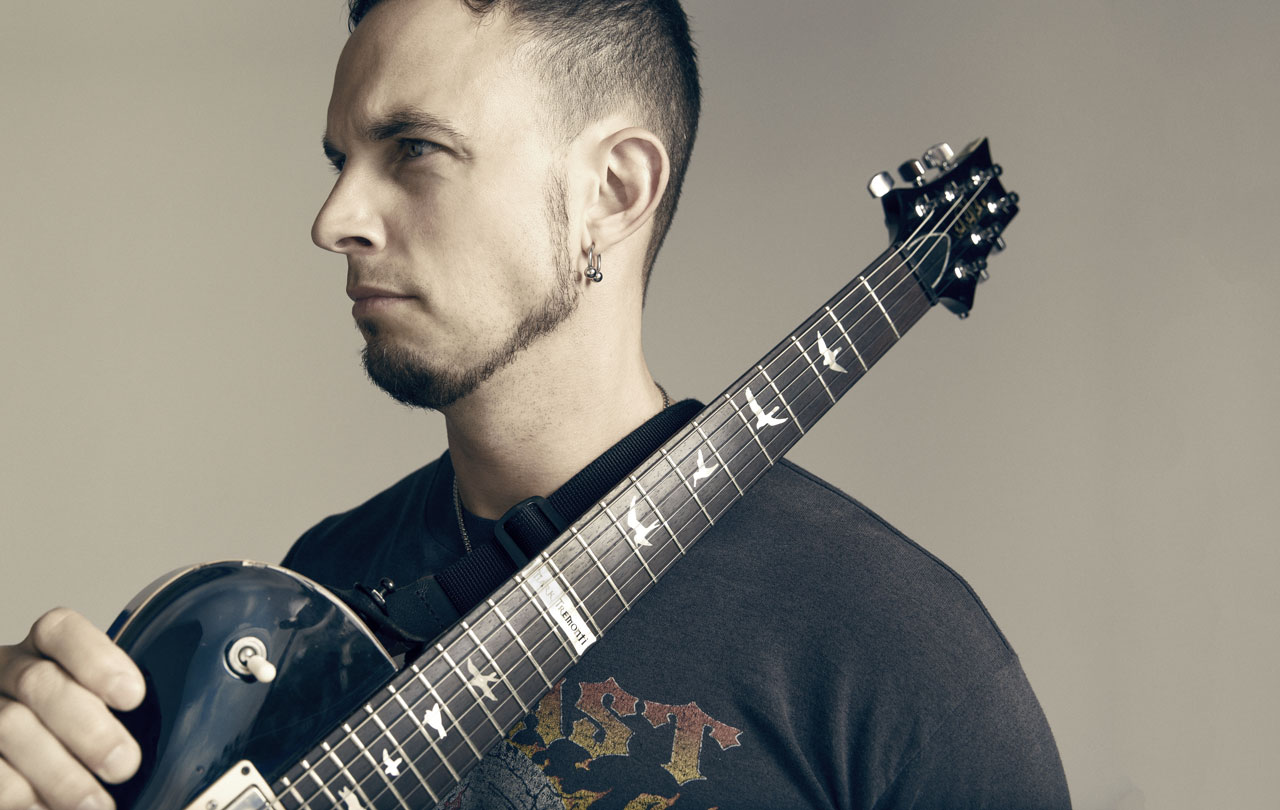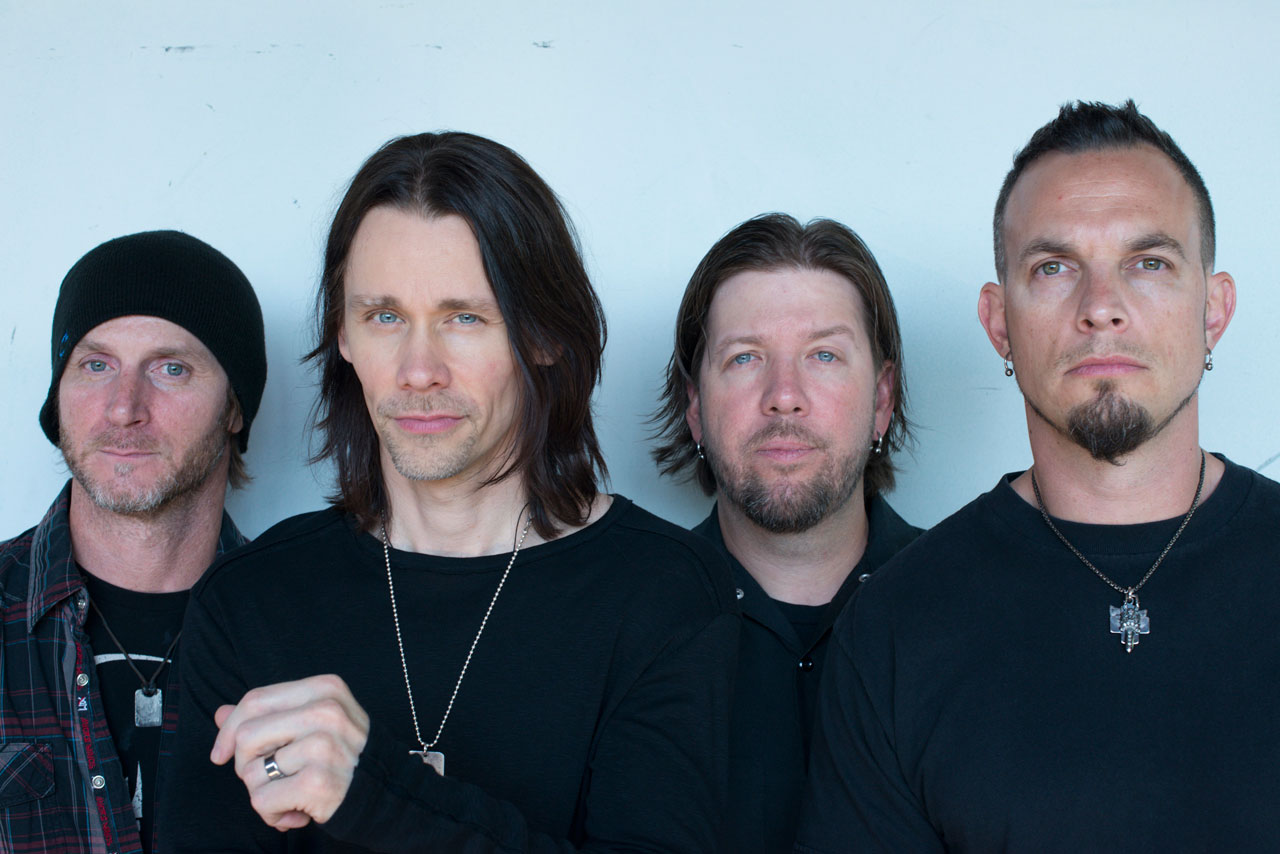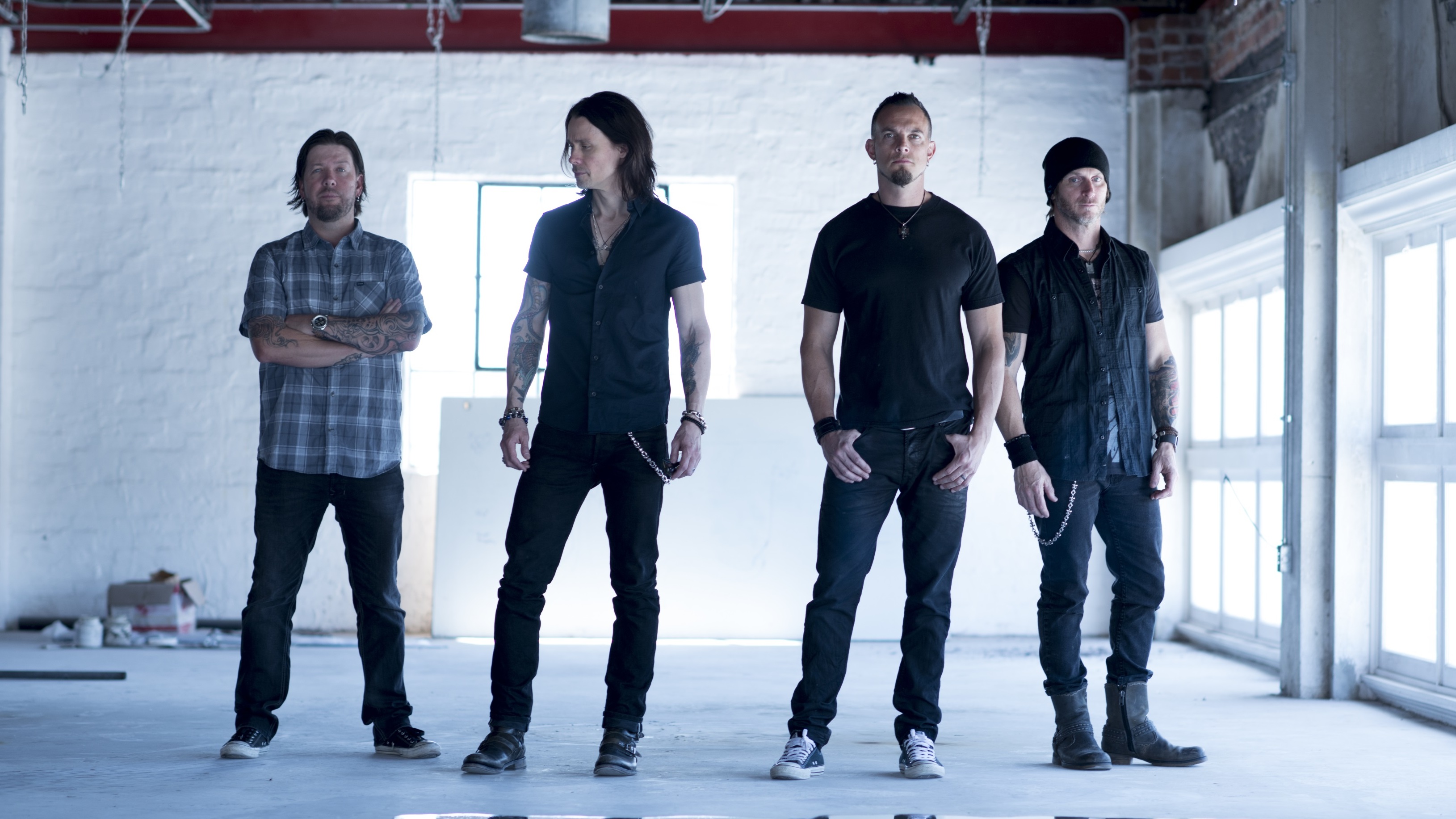Alter Bridge represent a victory for the everyman. Sure, founder Mark Tremonti is one of the last few guitar heroes standing, and singer Myles Kennedy’s association with Guns N’ Roses six-stringer Slash has given them a sprinkling of stardust by association, but their decade-long rise has been the result of graft, perseverance and quiet ambition.
“People hear the sincerity in what we do,” says Tremonti. “We write from the heart, we put everything we have into it. We write music that we would enjoy, and when you do that, you’re not trying to create a gimmick. People relate to that honesty.”
It’s an approach that has served Alter Bridge well so far – the band’s latest album, The Last Hero, entered the US Top 10 and UK Top 5. As they gear up for a UK and European arena tour, Tremonti looks back on escaping the shadow of his former band Creed, the battles the band have fought to get here and just what makes the perfect pinball machine.
The Last Hero is Alter Bridge’s fifth album. Do they get any easier to make?
This was one of the toughest yet. Usually, we have time to get together as a band and work songs out. But this time we jumped right into pre-production and tried to capture things in the moment. It was the loosest we’ve ever been, and it didn’t make things easier. But it gives it an exciting feel.
Does the fact that you’re involved with your side-project Tremonti at the same time make things more difficult?
This was the first time it wore me out. The two things kind of collided – I was just putting out my third record with Tremonti, and while I was doing the touring and promotion for that, I was writing this Alter Bridge record. It was round-the-clock work, plus you’re performing one record while you’re writing another. For the first time in my career, I was like, “You know what – this is a little too much”. But now we’ve switched into one band mode, it’s gotten a little easier.
That title: The Last Hero. Does it refer to anyone in particular?
It just refers to the lack of heroes in the world today. There are all these world leaders and very few of them are ones that you can really look up to and have faith in. It’s mostly people who are constantly putting people in danger, manipulating the system for their own devices.
That’s particularly relevant right now. You sound cynical about the whole political process.
Oh, absolutely. As long as I’ve been on this planet I haven’t seen things as twisted as they are right now. It’s crazy that in a world where there’s so many brilliant people, we have such few choices of people to lead us. Certainly here in the States we’re stuck with two people who are just pointing out each other’s deficiencies. It’s strange that these are the people are running the country. It’s just a big circus.
So are you supporting Trump or Clinton?
You know what, I would never answer a question that’s so polarising like that. [Laughing] I’m going to say no comment.
There are some personal moments on the album amid the big-picture stuff. Cradle To The Grave immediately stands out as a really soul-searching song. Myles has said that he wrote it as his mother-in-law was dying, and that it deals with loss and bereavement…
I think that’s a very personal song. I’ll kick around melody ideas with Myles, but we never know what the lyrics are going to be until the songs are done and Myles completes them. That song is a very personal story about how he grew up with his father [the singer’s dad died when Kennedy was a young child].
You’re all busy with things outside of Alter Bridge. Myles has his work with Slash and you have Tremonti. What takes priority?
I give them both everything I’ve got equally. Alter Bridge has such history now. We’ve had such battles with it over all the years, and we’ve finally come to a place where we’re all very proud of it. With Tremonti it’s so personal because I get to sing for the first time. The guitar is the most emotive instrument you can play, in my opinion, but there’s nothing quite like singing.
Was it hard for you to put yourself out there as a singer?
Well, there was no question that I wasn’t gonna sing on the solo records. When we put Alter Bridge together, I took a few vocal lessons, just enough for me to sing the original demos for [debut album] One Day Remains, but I felt like I just wasn’t good enough. I’ve been writing songs since I was 11 years old, and I’ve been singing them badly since then. But I never felt like the ideas I was writing would see their true potential with me singing them. I always felt like I needed to find somebody else to really deliver these ideas I had in my head. But one day I just started listening to the little cheap, cheesy demos I was making on my computer. I was like, you know what, I want this to sound exactly like I hear it in my head. I’ve got way too many ideas to just sit on all these, and a solo project would be the best outlet for that. So it was a hard decision, but also an easy one.

You’ve previously spoken about a lot of “battles” to get Alter Bridge to where you are today. What do you mean?
From the outside looking in, people can just see how we’ve grown. But on the business side of things we’ve been through so many record labels, and so many managers and business managers. We like to bury our heads in the sand and just write songs. But when you do that and you let people make decisions for you, sometimes you get taken advantage of, and that’s happened many times.
How demoralising has that been?
Oh, it’s been massively demoralising and stressful at times. We’re still dealing with it. We’ve had to buy ourselves out of two record deals, and we’ve paid for that ourselves – the new labels don’t pay for it. But it’s our career, and they’re decisions we’ve had to make along the way. Do we want to stick in a bad situation, or take a risk and put our neck on the line?
Did you ever wonder if it was all worth it?
No. This is all I’ve ever known as an adult. It’s my passion. For Myles and me, who have been songwriters since we were kids, it’s a battle worth fighting. And it’s not just the business side of things. You’ve got to remember, when the first record came out, we were called Creed Pt 2 in the States. We were three out of the four members of Creed with a new singer, and Creed had been so polarising. The critics weren’t nice to us at first. It took until Blackbird or even AB III for that to really turn around. That was what was so good about Europe. When we went over there, we were a fresh new band and nobody compared us to anything. They just gave us a chance. It was a blank slate.
You’re still bigger in Europe than you are in America. Is that a hangover from the Creed connection, or is it just because the climate in the US isn’t great for rock bands at the moment?
I think it’s a combination of both. It’s catching up at this point, but it’s taking a long time. On the last record, we’d go up the theatre-level in a lot of cities, which was big enough. But at first, being in Creed didn’t help in getting the band off the ground. It held us back in a lot of places.
Were you aware that might be the case?
I thought it would help. But you went to an Alter Bridge show and you hardly ever saw any Creed T-shirts. There were a few that came along, and I still meet people who say, “I’ve been a fan since [Creed’s debut album] My Own Prison”, but for the most part it’s a new fan base.
Creed’s singer Scott Stapp seemed to relish playing the part of the larger-than-life rock star. Both Myles and yourself seem to shy away from that sort of thing. But isn’t it the job of a musician to live up to that image?
That’s just something we’re not, you know, and I’m kind of proud of that. I’m proud to put the music first. The image doesn’t matter. It’s never been about image. Our videos are usually terrible, though the new one turned out great. We’re terrible at that side of things, and we all admit it, and that’s because we don’t care too much about it. We just care about the music. We’re not worried about how we perform on stage, because all we is what comes naturally.
There’s continually talk about rock being dead. Do you think it’s in a good place right now?
It went through a tough time, but I think it’s rebounded a bit. It’s not as strong as it once was, but it’s held on and it’s getting stronger.
Where does that leave Alter Bridge? Is it frustrating that you might have been bigger if you’d been around 20 or 25 years ago?
No. I’m proud of our success. We’re coming to the O2 Arena in London. That’s where Michael Jackson was playing before he died – it doesn’t get much bigger than that unless you’re talking about stadiums. Rock’n’roll is kind of a niche market in the US, but we’re doing the best we can in a niche. It goes through cycles. I was explaining to my son yesterday about how rock’n’roll was the biggest thing in the 80s. Now it’s rap and pop and country.
- The Story of Alter Bridge's Blackbird
- Alter Bridge: Myles Kennedy’s Guide To Life
- The best Scott Stapp memes on the internet
- Mark Tremonti’s 5 Essential Guitar Albums
A lot of rockers are going country. Steven Tyler’s just made a country album. Are you tempted to go in that direction?
Well, they have a lot of great guitar players, I can say that much… [laughs]
How do you relax away from the band – and away from the guitar?
I’m a pinball fan. I collect pinball machines. I have 12. I’ll go online and research the best machines. A lot of the best games came from the late 80s and early 90s – things like the Medieval Madness games, or the Twilight Zone or Cirqus Voltaire. Very involved machines that are fun to play.
What’s the most expensive pinball machine you’ve bought?
I think the most expensive was around £4,000. But that was 10 years ago or more, and all those machines have doubled in value. A machine that you bought for $1,500 back in the day is now worth $8,000, which is a great investment.

Do you socialise with the other members of Alter Bridge away from the band?
Me and [drummer] Scott Philips are together all the time, because we live right down the street from one another. But Myles lives across the country, and when we’re not doing Alter Bridge, we’re busy doing our other bands, so we hardly ever see each other when we’re off the road.
What did you first bond with Myles over?
Music. We’re two peas in a pod: we’re both music fanatics. We’re guitar nerds.
When did you know it would work out with him?
When I made the demos for One Day Remains, I sent him three tracks and he loved them. He had turned down some offers to play in other bands – I think one of them was Velvet Revolver – because he thought he had some tinnitus issues or something, and he felt like he couldn’t damage his ears. But he got over that issue and sang on the demos I’d sent him. He sent them back to me and I loved them. It sounded so different to what we’d done before. You can’t get two more different singers than Scott Stapp and Myles Kennedy.
What does Myles bring to the table that Scott Stapp didn’t?
In Creed I would bring all the ideas to the table, and then we would manipulate it from there. With Alter Bridge, me and Myles have an understanding where, when we get together, I’ll play him my part, he’ll play me his part and then we’ll put our parts together like puzzle pieces to create albums. Other than on the first record, there’s pretty much no Alter Bridge song that didn’t have both of our input in it.
Here’s the $64,000 question. Who’s the best guitarist in Alter Bridge: you or Myles?
When we started out, he hid his guitar talent from us. I think he was being modest. I remember walking past a room he was in one day and hearing all this jazz guitar coming out. I opened the door and it was him playing it. I was blown away. We both have our strengths, I think. If we’re playing Metallica or Slayer songs, I’m your guy. But if you’re talking about jazz, Myles is the one. But I think it’s Myles. Me and Slash have both said in interviews that Myles is the best guitar player out there.
Alter Bridge’s new album, The Last Hero, is out now. Their UK tour begins on November 23.

